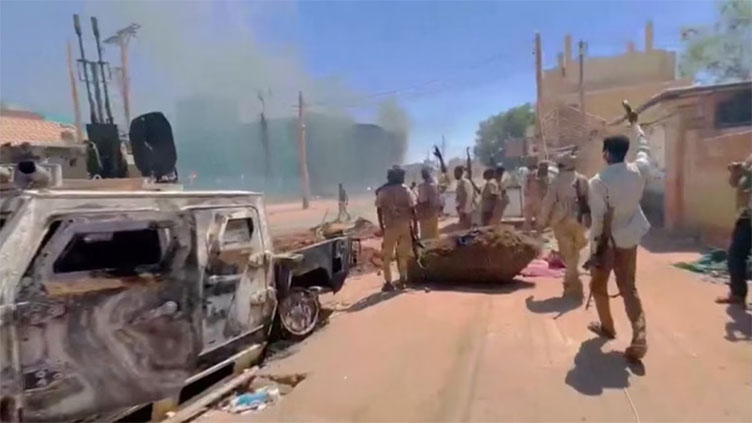With shouts and machine guns, war plays out as half Sudan needs aid

World
The United Nations said more than 50 percent of the country's people need aid.
KHARTOUM (AFP) – On a sandy lot below a Khartoum apartment building, helmetless Sudanese soldiers in a mishmash of uniforms raised their fists as machine gunners blasted away from atop two small trucks.
It was another day in a war which has not stopped for more than a month, and continued Wednesday, as the UN said more than 50 percent of the country's people need aid.
"Today, 25 million people -- more than half the population of Sudan -- needs humanitarian aid and protection," Ramesh Rajasingham, head of the UN humanitarian agency's Geneva bureau, told reporters there.
"That is the highest number we have ever seen in the country," where one in three already relied on assistance before the war and millions had been displaced by previous conflicts.
Around 1,000 people have been killed, mainly in and around Khartoum as well as in the long-troubled western region of Darfur.
More than one million others have been uprooted by the battles between army chief Abdel Fattah al-Burhan and his former deputy Mohamed Hamdan Daglo, who leads the paramilitary Rapid Support Forces (RSF).
Analysts say neither side has been able to seize an advantage on the battlefield, which played out in one part of Khartoum on Tuesday.
MULTIPLE FIRES BURNING
In Khartoum, some soldiers stood in front of the five-storey apartment building with rocket-propelled grenade launchers and another danced about with a belt-fed machine gun on ground that appeared littered with dozens of spent large-calibre shell casings.
In other parts of the capital, long mounds of dirt are piled beside roads where military trenches have been dug.
Across the Nile river, aerial footage showed a hellish scene in the Omdurman Market area, a heavily built-up district where multiple fires burned and people ran on rubble strewn streets. Some appeared to be lugging white bags as heavy black smoke choked the air.
With bullets flying, Rajasingham said millions remained confined to their homes, unable to access basic services and health care.
More than 5,000 people have been injured.
In Africa's third-largest country, many areas remain untouched by the fighting but still suffer its effects, with soaring prices and shortages of fuel.
"Petrol is not available now and the price has increased on the black market. People can't transport their vegetables," said Abu Bakr Abdullah, 27, a farmer in River Nile state.
Another farmer, Qamar al-Bashir, 52, complained that four years have passed since longtime autocrat Omar al-Bashir was toppled but "they have not been able to form a government".
A coup in 2021 by Burhan and Daglo derailed a fragile transition to civilian rule.
"Enough!" said Bashir, the farmer. "You can't move the country forward, do you move it backwards? And at the end you take us to war for your own personal interests."
Last Thursday the warring sides signed in Jeddah, Saudi Arabia, a commitment to respect humanitarian principles and allow in badly needed aid.
However, reports of attacks continued.
LOOTING, DESTRUCTION
Toby Harward, of the UN refugee agency (UNHCR), reported an "extremely disturbing" situation in El Geneina, the West Darfur capital.
Hundreds of civilians have been killed in militia attacks on residential areas and street battles between "community-aligned forces". There has also been looting and destruction at markets, camps for displaced people, and other locations, he wrote Tuesday on Twitter.
Doctors Without Borders (MSF) on Wednesday called "unacceptable" the looting of aid organisations after armed men raided its Khartoum warehouse the day before.
In Khartoum North, a factory that produced food to treat malnourished children burned down earlier, according to the UN children's fund.
Still, the World Food Programme is distributing food in some Darfur states as well as other parts of the country in a "rapidly scaling up" of emergency operations, the agency said.
Rajasingham highlighted an uptick in aid deliveries and voiced hope the Jeddah agreement was having some effect. He said fighters had pulled back from some of the health facilities previously occupied.
But aid agencies need an increasing amount of money.
The UN said $2.56 billion is now expected to be required to provide assistance for 18 million people inside Sudan, plus an additional $470.4 million to help those fleeing the country.
More than 840,000 are already displaced inside Sudan and at least 220,000 have crossed borders out of the country, it said.
"The crisis in Sudan is rapidly evolving into a regional crisis," Rajasingham said.
Sudan's war is expected to be a major agenda item during the Arab League summit on Friday in Saudi Arabia, where an envoy of Burhan will represent the country.
Heavyweights in the pan-Arab bloc are divided on Sudan, with Egypt supporting Burhan and the United Arab Emirates, according to experts, seen to be backing the RSF.
On Wednesday, Kenyan President William Ruto urged the warring generals to "stop the nonsense" and called for a rethink of the African Union's approach to conflicts in the continent.

